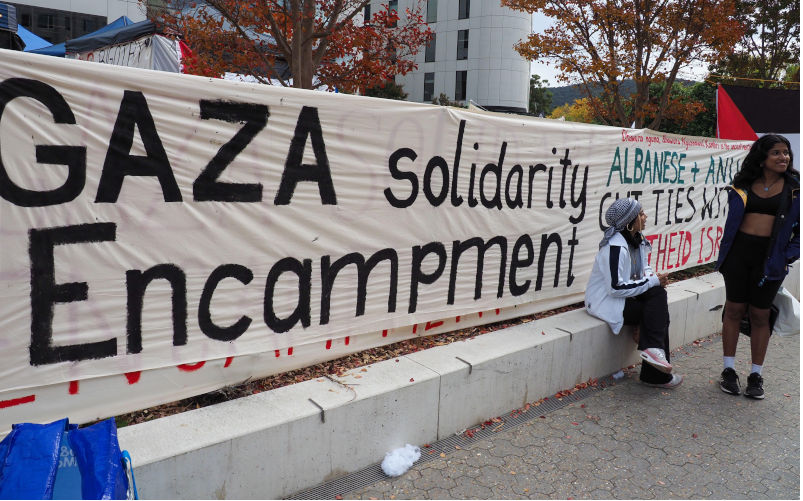Thank you to the ANU Gaza Solidarity Encampment
September 1, 2024
After a record 111 days, students at the ANU Gaza Solidarity Encampment finally took down their tents on 17-18 August and began a new phase of activism.
The Encampment was established on 29 April to put pressure on the Australian National University to disclose and divest from arms manufacturers (the ANU has at least $1 million invested in Northrop Grumman, BAE, Lockheed Martin and other arms manufacturers); cut all ties with Israeli universities and research institutions, including the Hebrew University of Jerusalem; and condemn the destruction of all universities in Gaza and the killing of Palestinian academics and students.
In response, the ANU management put the Encampment under 24 hour surveillance; imposed disciplinary measures against individual students with little or no explanation; made spurious claims to the effect that the tents were damaging the grass and occupying a fire evacuation area; called in the police; falsely represented the encampment on the university web page and in the media; called in health and safety inspectors, who repeatedly entered students’ tents in the middle of the night; cut off electricity at the encampment; and, finally, banned all appliances, except mobile phones and laptop computers. They even banned battery-operated lights.
At no stage did either the ANU Vice-Chancellor, Professor Genevieve Bell, or the Deputy Vice-Chancellor, Professor Grady Venville, visit the Encampment. They offered to meet Encampment representatives, but only on condition that they identify themselves. The students refused these conditions, firstly because, as a group engaged in participatory democracy, they had no individual representatives. Secondly, they were justifiably concerned that any encampment member who identified themselves would be subjected to disciplinary measures.
In an attempt to improve communication, Encampment members asked a group of staff members to serve as intermediaries. Ten people — A/Prof. Nick Cheesman, Dr Lachlan Clohesy (NTEU ACT Div. Secretary), Prof. Melinda Cooper, A/Prof. Elise Klein, Prof. Sango Mahanty, Prof. Rebecca Monson, Mr Matthew Phillipps, A/Prof. Ntina Tzouvala, A/Prof. Matthew Zagor and myself — volunteered for this role and made requests to meet the vice-chancellor and other senior members of management. After several requests, they finally agreed and met members of our team on 12 June, 4 July and 25 July to discuss Encampment demands.
Despite harassment and coercive pressure from ANU, amounting to violation of students’ basic human rights, the Encampment persisted all through Canberra’s bitterly cold and wet winter. As a side note, several sleeping mats lent to the students got so mouldy they had to be thrown out.
University Management refused to address Encampment demands directly. But all the same, the Encampment achieved a great deal. In particular, its members succeeded in pressuring the ANU to conduct a review of its “Socially Responsible Investment Policy”. After the review, the iniversity announced the policy would be revised to include “negative screening for controversial weaponry”.
In addition, the Encampment generated widespread awareness and concern among ANU students and staff about Israeli occupation and genocide in Gaza, about the university’s entanglement with the military industrial complex, and about the fact that its ties with Israeli institutions and its investment in weapons manufacturers likely make it complicit in genocide.
Furthermore, the Encampment gave dozens of students an education in politics and political activism far richer and more extensive than anything they could receive in the classroom.
Last, but by no means least, it generated a sense of community and solidarity and contributed to the formation of a strong network of university students and staff, Palestinian Australians and other members of the community here in Canberra and beyond, working for justice for Palestine.
The struggle has not ended; it has just begun, and much remains to be done. The ANU must cut its ties with all Israeli institutions and must stop investing in weapons companies. Failure to do so puts the university at serious risk of being charged with complicity in genocide.
Revision of the Socially Responsible Investment Policy to include “negative screening for controversial weaponry” is only a first step. This vague terminology needs to be clearly defined and explained or, ideally, replaced with explicit divestment and a future ban on investment in companies that manufacture weaponry and/or contribute to genocide.
On 18 August, 300 students at an ANU Student Association student general meeting voted to:
- call on the ANU to disclose and cut all ties with weapons companies involved in the development and manufacture of weapons used by the Israel Defence Force – including divesting from stocks in those companies, ending any research partnerships and ceasing all other relationships;
- demand the ANU cut all ties with Israeli universities, including the Hebrew University of Jerusalem, that help Israel oppress Palestinians and commit its genocide in Gaza, and demand the ANU cut all ties with the Australian Signals Directorate which is involved in running the US Pine Gap spy base that provides intelligence used in Israel’s genocide; and
- disrupt business as usual at ANU while our university is complicit in genocide and has not agreed to our demands to cut ties with Israel.
This student general meeting pledged to use “actions like walk-offs, sit-ins, mass rallies, student encampments and strikes to force our university to cut ties with Israel”.
Further student meetings and protests are planned for the near future. The members of the staff mediation team will also meet to take stock and discuss where we go from here, not necessarily as intermediaries, but as a network of progressive academics who still have a job ahead of us.
We would like to thank members of the Encampment and other students striving to end ANU complicity in the Gaza genocide and to achieve justice for Palestinians. Thank you for your dedication, for the sacrifices you have made, for the tremendous work you have done and continue to do, and for the inspiration and hope you give us all.
